दही रेसिपी - हिन्दी में पढ़ें (curd recipes in Hindi)
દહીં રેસીપી - ગુજરાતી માં વાંચો (curd recipes in Gujarati)
Curds Recipes, Raitas
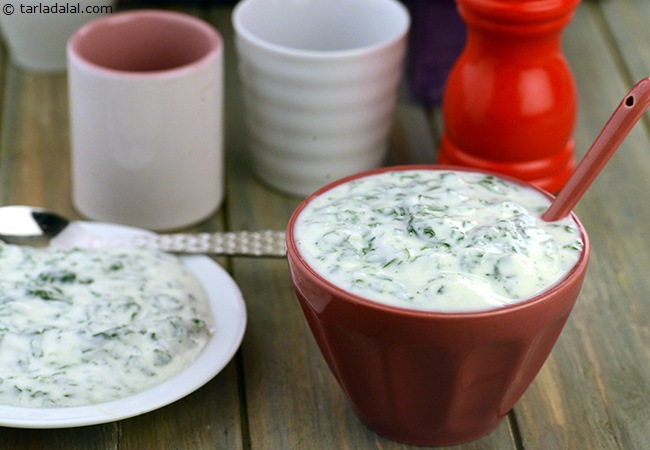 Palak Raita
Palak Raita
Rice preparations like Biryani and Pulao are incomplete without Raitas. Raita is a side-dish (Indian accompaniment) made using curd, vegetables or fruits or a combination of both, spices like cumin seeds powder and chilli powder. You can even enhance the flavor with the addition of finely chopped green chillies or coriander. There are basically two types of raita, sweet and savory. Raita recipes like the mango raita, pineapple raita are sweetened using powdered sugar. Palak raita, Boondi raita, Tomato raita, Phudina raita are some of the famous raitas in India.
Curd Recipes Indian
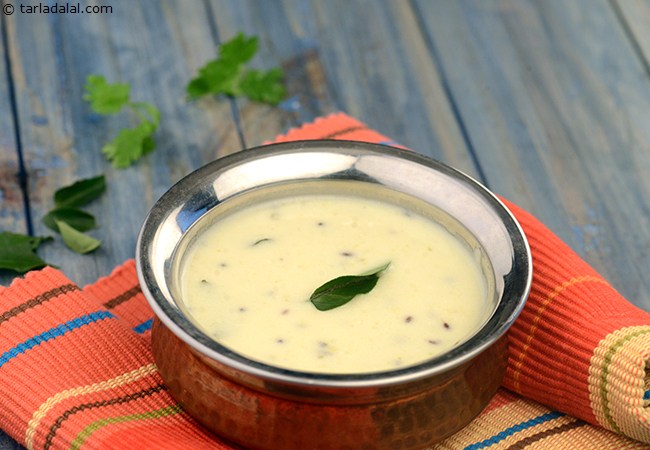 Kadhi
Kadhi
Kadhi is inseparable from the Gujarati cuisine. It is basically a wonderful sweet and spicy curd mixture thickened with gram flour. It is tempered with aromatic ingredients like cumin seeds, curry leaves, asafetida. In fact, the simple kadhi can be enhanced with the addition of pakoda, sprouts or any vegetables. Make varieties of Bhatia Kadhi, Punjabi Pakoda Kadhi, Dapka kadhi, Mooli Ke Patte Ki Kadhi from across all the communities and relish them with rice or khichdi. Peanut Kadhi is a Faral recipe had during Janmashtami. You can find many kadhi recipes using curd below.
Recipes using curds in Chaats
.JPG)
Aloo Chaat
Chaats are delectable snacks made with a myriad of ingredients ranging from vegetables, chutneys, crispy snacks like sev, paapdi and puri and tongue-tickling spice powders like cumin seeds powder, chili powder, black salt. You can even perk up simple chaats wit hthe addition of dahi to make popular Mumbai Chaat recipes like Dahi Batata Puri, Papadi Chaat and Aloo Chaat. For a healthy office snack, try the Healthy Moong Chaat. We have lots of exciting chaat recipes using curds below.
Seven steps to make the perfect curd
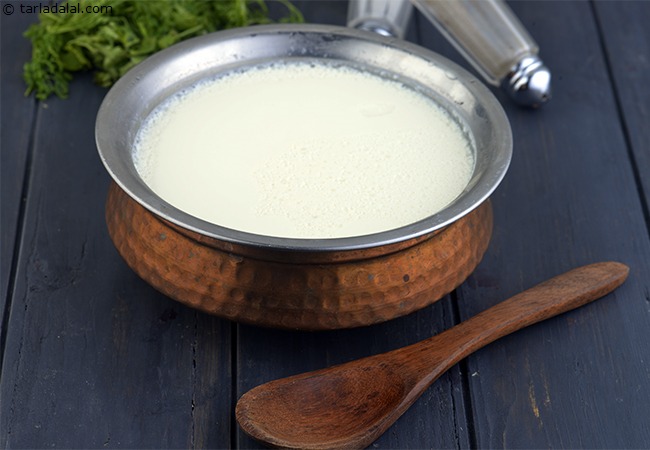 Curd
Curd
1. Curd is made by adding a sample of curd (also known as curd culture, curd bacteria, lactic acid bacteria, etc.) to warm milk, and allowing the mixture to ferment in a closed container in a warm place till it sets firmly. In summer, it sets in around 5 hours; but in winter it takes longer, any time between 8 to 15 hours!
2. Curd sets faster when kept overnight in a warm place in a steel container.
3. At times, a pinch of sugar can be added to the milk before fermenting it, to make sure the resulting curd is not too sour.
4. Always cover the cultured milk with a lid, for it to set properly.
5. When adding the curd culture to the milk, make sure the milk is warm. If it is too cold, it will not set. If it is too hot, it will either curdle immediately or give you watery curds.
6. Use a whisk to combine the small curd sample with the milk, so that the sample disperses well and gives you a good thick curd.
7. The readymade ‘set curds’ available in India are often not useful as cultures to make homemade curd. So if you need a sample to make curds, try to buy natural curd from a local dairy or get a homemade sample from a friend.
Know more about recipes using curds
Curd is used widely across the world. It is relished just plain, enjoyed with toppings, made into a raita or used in other recipes. Creamy hung curd is also used to make delicious mithai like Shrikand. Many people also enjoy having a glass of plain or spiced buttermilk with their lunch. It is refreshing, cools the body and aids in digestion.
2. Some recipes like raita and buttermilk require fresh curds, while others like dhokla, handvo, kadhi, etc., require sour curds.
3. Some recipes like Shrikand and sandwich spreads require hung curds. This is basically curd that is placed in a muslin cloth and hung from a hook or rod for at least one hour to drain the water completely. The resulting hung curd is really creamy and thick.
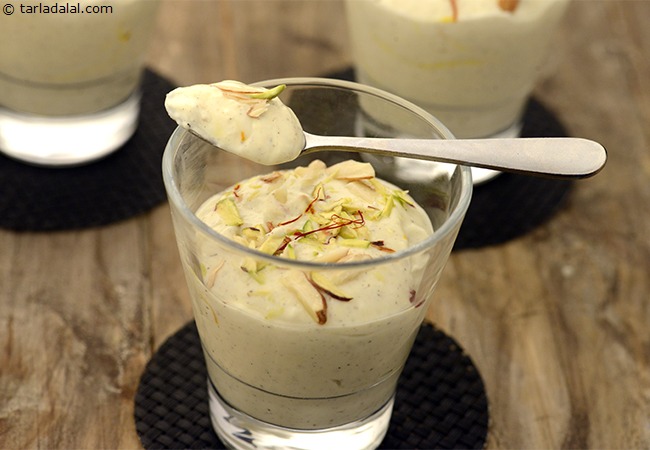
Shrikhand
14 ways to have recipes using curds, yoghurt
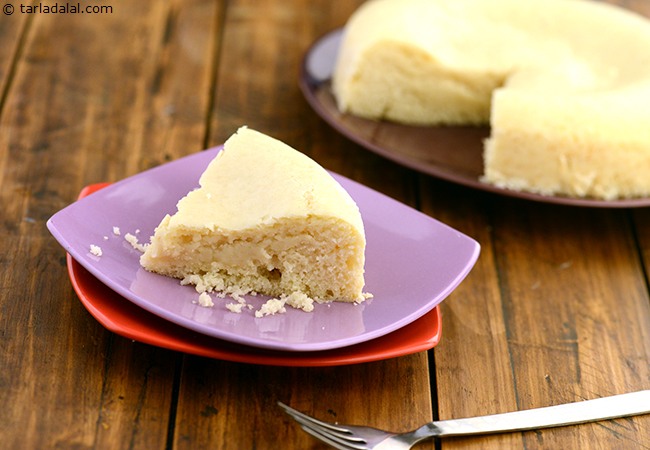 Eggless Vanilla Sponge Cake Using Curds
Eggless Vanilla Sponge Cake Using Curds
The most popular South Indian curd recipe, Curd Rice is a great comfort food.
Health Benefits of Curd, Yoghurt, Dahi
1. Improves Digestion : Curd has very good bacteria for aiding digestion in the gut. However only 30% of the curd sold in the supermarkets have Probiotics added to them ( an ingredients that contains good live bacteria) which soothe the stomach. So look for Probiotic Curds in the supermarket as a much better choice than regular curds. Note that homemade curds will not have Probiotics added to them. 2. High in Protein : One cup of curds has 8.7 grams of protein. 3. Low Carbs : Following a low carb diet, have lots of curd. Once cup of curds has only 9 grams of carbs. Try our healthy Raitas. 4. Lactose Intolerant : There are some who are lactose intolerant to milk but okay with curd. It converts lactose present in milk to lactic acid making it easier to digest. 5. High in Calcium : Calcium is a mineral that makes bones stay strong. The human body consistently remove small amounts of calcium from our bones and that has to be topped up with Calcium rich foods. As we age, we need to eat foods high in calcium to make up for this lower absorption and to help maintain the bone strength gained in the former years. One bowl of curd has 426 mg of Calcium which is nearly 45% of RDA for an adult male. 6. Good for those with High Blood Pressure : Curds are rich in Potassium which will help balance the sodium levels in your body.
Enjoy our Curd, Dahi, Yogurt Recipes | Recipes using Dahi | Indian Curd Recipes collection below. You may find our whisked curd recipes and article on hung curds recipes useful.